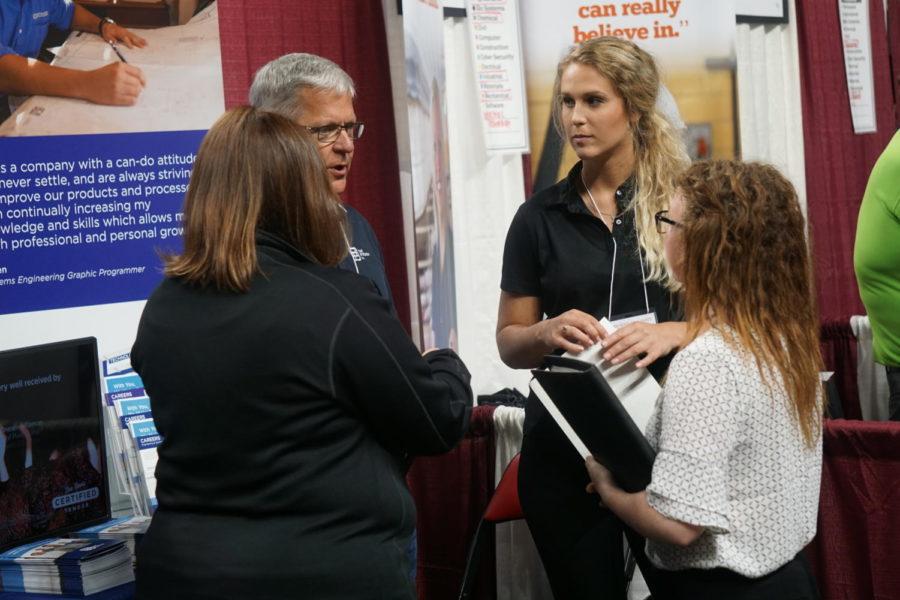The only girl in the room: women in male-dominated majors
Megan Petzold/Iowa State Daily
During the Engineering Career Fair on Sept. 25, 2018 many students interviewed with companies in hopes of an internship or co-op. The Engineering Career Fair brought in hundreds of employers ready to listen to students’ speeches and presentations.
February 12, 2019
Women at Iowa State account for almost half of the student population and, on average, produce higher grade point averages according to the Iowa State Department of Institutional Research. Despite success in the classroom, some female engineering students feel there is still work to be done for female representation.
There are 29,621 undergraduate students at Iowa State, according to the Iowa State Department of Institutional Research. Of these nearly 30,000 students, 17,075 are men and 12,546 are women. As shown in the figures below, women enrollment is almost equal to or greater than male enrollment; the one exception to this is the engineering college.
In the College of Engineering, there are 6,592 enrolled males and 1,296 enrolled females. For many female engineering students, it’s not abnormal to be the only girl in the room.
“I’ve been in classes where there were one or two girls,” said Madison Kriege, a senior in computer engineering. “It can be frustrating, because sometimes I feel more pressure, but I’m also so fortunate to have such great resources on campus that help give me a community.”
One of the resources that female engineering students have on campus is Women in Science and Engineering (WiSE).
“Traditionally, women gravitate towards careers that they feel they can help people in,” said WiSE Program Manager Lora Leigh Chrystal. “Unfortunately, engineering isn’t being shown to girls at a young age as a career that has humanitarian fulfillment.”
Unawareness about humanitarian fulfillment as a part of engineering isn’t the only reason women might deter from engineering majors.
Imposters syndrome is something that can affect Iowa State students, Chyrstal said. Imposter syndrome is “commonly understood as a false and sometimes crippling belief that one’s successes are the product of luck or fraud rather than skill,” according to the Merriam-Webster dictionary.
“My first year, I would say I had a bit of imposters syndrome. I used to think I wasn’t good enough,” Kriege said. “However, it only made me want to work harder because I knew what I was capable of.”
Chrystal also said a lack of representation is a reason that some girls might be turned away from engineering. In her position at WiSE, Chrystal said she is working to change that. The program has implemented programs where members of WiSE go to K-12 classrooms to speak with young girls and highlight the engineering program at Iowa State.
Ashley Trevino, a senior in mechanical engineering, said she chose engineering because of the exposure she had to STEM programs in high school.
“Through WiSE, we reach out to young girls and show them what they can do in engineering,” Trevino said. “It’s exciting, because I’m starting to see some of those girls who came to our engineering camps in the classrooms at Iowa State.”
Although there are resources on campus to help close the gap between men and women in the engineering field, there are still hurdles in the classroom.
“Sometimes it’s challenging being one of the only females in the class, especially when it comes to group projects,” Trevino said. “I’m usually the one who takes the lead in group scenarios because I care about my grades, but I fear being labeled as bossy. If a male were to take the lead in the group, I don’t know if he would get that same label.”
Emma Stobbe, a junior in engineering, said that being in the underrepresented group in the classroom makes her want to prove people wrong.
Chrystal said a common misconception in the engineering field is the intelligence expectations for men and women.
“People think a man can be an engineer, but only a smart woman can,” Chrystal said. “This forces women to feel like they have to work harder, which could contribute to their academic success”
Ava Depping, a sophomore in mechanical engineering, said that she has noticed if you’re a female in engineering, people expect you to be good at it and smart.
Trevino said she tries to correct these misconceptions in the classroom whenever she gets the chance.
“My classmates are going to deal with women in the future in the workplace,” Trevino said. “If I can correct them or help them see female engineers in a positive light, I’m saving some work for the next girl.”
















